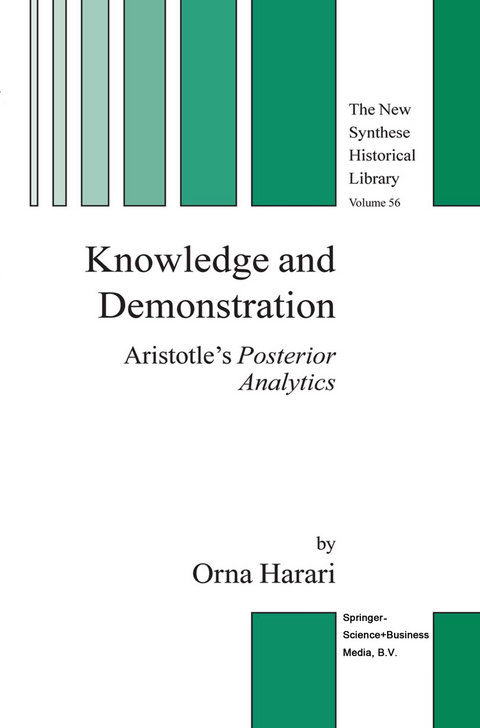
Knowledge and Demonstration
Aristotle’s Posterior Analytics
Seiten
2010
|
Softcover reprint of hardcover 1st ed. 2004
Springer (Verlag)
978-90-481-6722-7 (ISBN)
Springer (Verlag)
978-90-481-6722-7 (ISBN)
This study explores the theoretical relationship between Aristotle’s theory of syllogism and his conception of demonstrative knowledge. The problem of the relationship between Aristotle’s logic and his theory of proof is commonly approached from the standpoint of whether the theory of demonstration presupposes the theory of syllogism.
This study explores the theoretical relationship between Aristotle’s theory of syllogism and his conception of demonstrative knowledge. More specifically, I consider why Aristotle’s theory of demonstration presupposes his theory of syllogism. In reconsidering the relationship between Aristotle’s two Analytics, I modify this widely discussed question. The problem of the relationship between Aristotle’s logic and his theory of proof is commonly approached from the standpoint of whether the theory of demonstration presupposes the theory of syllogism. By contrast, I assume the theoretical relationship between these two theories from the start. This assumption is based on much explicit textual evidence indicating that Aristotle considers the theory of demonstration a branch of the theory of syllogism. I see no textual reasons for doubting the theoretical relationship between Aristotle’s two Analytics so I attempt to uncover here the common theoretical assumptions that relate the syllogistic form of reasoning to the cognitive state (i. e. , knowledge), which is attained through syllogistic inferences. This modification of the traditional approach reflects the wider objective of this essay. Unlike the traditional interpretation, which views the Posterior Analytics in light of scientific practice, this study aims to lay the foundation for a comprehensive interpretation of the Posterior Analytics, considering this work from a metaphysical perspective. One of my major assertions is that Aristotle’s conception of substance is essential for a grasp of his theory of demonstration in general, and of the role of syllogistic logic in particular.
This study explores the theoretical relationship between Aristotle’s theory of syllogism and his conception of demonstrative knowledge. More specifically, I consider why Aristotle’s theory of demonstration presupposes his theory of syllogism. In reconsidering the relationship between Aristotle’s two Analytics, I modify this widely discussed question. The problem of the relationship between Aristotle’s logic and his theory of proof is commonly approached from the standpoint of whether the theory of demonstration presupposes the theory of syllogism. By contrast, I assume the theoretical relationship between these two theories from the start. This assumption is based on much explicit textual evidence indicating that Aristotle considers the theory of demonstration a branch of the theory of syllogism. I see no textual reasons for doubting the theoretical relationship between Aristotle’s two Analytics so I attempt to uncover here the common theoretical assumptions that relate the syllogistic form of reasoning to the cognitive state (i. e. , knowledge), which is attained through syllogistic inferences. This modification of the traditional approach reflects the wider objective of this essay. Unlike the traditional interpretation, which views the Posterior Analytics in light of scientific practice, this study aims to lay the foundation for a comprehensive interpretation of the Posterior Analytics, considering this work from a metaphysical perspective. One of my major assertions is that Aristotle’s conception of substance is essential for a grasp of his theory of demonstration in general, and of the role of syllogistic logic in particular.
1. Intellect as a First Principle.- 2. The Immediate Premiss.- 3. The Logic of Demonstration.- 4. Syllogism and the Object of Knowledge.- 5. Knowledge and Demonstration.- Conclusion.- Select Bibliography.- General Index.
| Erscheint lt. Verlag | 4.12.2010 |
|---|---|
| Reihe/Serie | The New Synthese Historical Library ; 56 |
| Zusatzinfo | X, 162 p. |
| Verlagsort | Dordrecht |
| Sprache | englisch |
| Maße | 155 x 235 mm |
| Themenwelt | Geisteswissenschaften ► Philosophie ► Allgemeines / Lexika |
| Geisteswissenschaften ► Philosophie ► Geschichte der Philosophie | |
| Geisteswissenschaften ► Philosophie ► Logik | |
| Geisteswissenschaften ► Philosophie ► Philosophie Altertum / Antike | |
| Geisteswissenschaften ► Philosophie ► Philosophie der Neuzeit | |
| Naturwissenschaften | |
| ISBN-10 | 90-481-6722-1 / 9048167221 |
| ISBN-13 | 978-90-481-6722-7 / 9789048167227 |
| Zustand | Neuware |
| Haben Sie eine Frage zum Produkt? |
Mehr entdecken
aus dem Bereich
aus dem Bereich
die letzten Jahre der Philosophie und der Beginn einer neuen …
Buch | Hardcover (2024)
Klett-Cotta (Verlag)
28,00 €
Gesundheitsschutz, Selbstbestimmungsrechte, Rechtspolitik
Buch | Softcover (2024)
Kohlhammer (Verlag)
39,00 €
Jenseits von Identität | Ausgezeichnet mit dem Leipziger Buchpreis …
Buch | Softcover (2023)
Ullstein Taschenbuch Verlag
13,99 €


